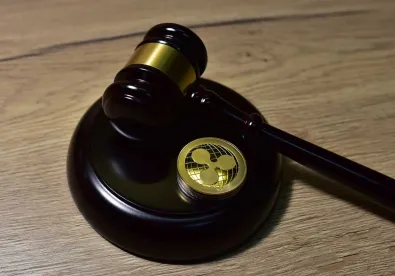On Dec. 12, 2020, the U.S. Securities and Exchange Commission brought what crypto followers consider one of the most consequential enforcement actions related to the sale of cryptocurrency since the industry’s inception. The lawsuit is against Ripple Labs, Inc., creator of the XRP token—which was at the time one of the top cryptocurrencies by market capitalization at $27 billion. By the end of the month in which the complaint was filed, Ripple’s market capitalization dropped to $16 billion. The SEC alleged in its complaint that Ripple and related defendants violated Sections 5(a) and 5(c) of the Securities Act of 1933 by engaging in the unlawful offer and sale of securities in exchange for cash and other consideration worth over $1.38 billion.
The lawsuit caused waves given not only the SEC’s decision to pursue an enforcement action against the issuer of one of the most popular cryptocurrencies in circulation but also Ripple’s quick announcement of its intention to vigorously fight the lawsuit.
The case now has reached a decisive point, as both sides filed motions for summary judgment in mid-September asking the court, in part, to decide the most significant issue in the case: whether XRP is a security that needs to be registered pursuant to the Securities Act. Should the court grant summary judgment with respect to this issue, it will effectively have decided the case. If Ripple prevails on its motion, and the court holds that XRP is not a security, there can be no violation for the sale of unregistered securities. It would also represent the most significant defeat yet in the SEC’s campaign to regulate cryptocurrency. If the SEC prevails on its motion, however, it will be another victory for the regulator that has repeatedly succeeded in actions against cryptocurrency issuers. If the court denies both motions, the issue will be litigated at a trial on the merits.
The crux of the dispute is whether XRP can be considered an “investment contract” and therefore a security under the Securities Act. An investment contract is one category of instrument over which the SEC has been granted regulatory authority. The term is not defined in the federal securities laws, but the U.S. Supreme Court in the 1946 landmark case SEC v. W.J. Howey Co. provided guidance on the essential elements of what constitutes an investment contract. It held that an investment contract is an “investment in a common venture premised on a reasonable expectation of profits to be derived from the … efforts of others.” While subsequent cases have refined the test, the essential holding of Howey remains intact.
The SEC argues that XRP falls squarely within the definition of an investment contract under Howey and its progeny. According to the SEC, purchasers of XRP invested in a common enterprise because those purchasers were entitled to receive returns directly proportionate to their stake in the token, or alternatively, the fortunes of the purchasers were tied to the fortunes of the promoter, in this case Ripple, which was the largest holder of the token from its creation. The SEC further argues it was clear that purchasers of XRP reasonably expected to profit from their purchase, in part because Ripple openly promoted the token as an investment from the outset, marketed and took steps to ensure purchasers’ ability to resell XRP on secondary markets, and touted its efforts to provide and protect the liquidity of the XRP markets, among other reasons. To this end, the SEC argues that XRP purchasers expected their profits to result from Ripple’s efforts. Ripple “repeatedly vowed to develop a ‘use’ and increase the ‘utility’ or ‘demand’ for XRP” and touted its past efforts and future intentions to boost XRP liquidity. If the court accepts these arguments, the SEC will have established XRP is an investment contract and therefore is subject to the regulations imposed by the federal securities laws, including that it be registered as a security.
By contrast, Ripple argues that XRP lacks the “essential ingredients” to be considered an investment contract. According to Ripple, every investment contract case prior to 1933 involved an actual “contract,” imposed post-sale obligations on the promoter, and gave the investor a right to receive profits. Ripple contends that none of these characteristics apply to XRP and that no Supreme Court or Second Circuit Court of Appeals case since Howey has found an investment contract to exist without these three characteristics. In response, the SEC accuses Ripple of conceding it could not prevail under existing law and labels the “essential ingredients” argument an attempt to “read three new prongs into Howey.”
Ripple also challenges the SEC’s assertion that XRP transactions were offers and sales of investment contracts even under the traditional Howey test, arguing that, in many cases, there was no investment of money, since Ripple gave away more than two billion tokens to charities and grant recipients, and that no common enterprise existed because Ripple does not manage, control, or operate a profit-seeking business venture. Ripple argues that millions of participants worldwide are capable of implementing changes to XRP’s blockchain, in some cases when Ripple itself opposes those changes. Lastly, Ripple contends no buyer of XRP could reasonably expect profits from Ripple’s efforts because Ripple was under no contractual obligation to undertake such efforts.
A decision by the court on the competing motions is expected soon. If Ripple prevails, the SEC will have been dealt a major defeat, not only because it will have lost one of the most significant cryptocurrency enforcement actions ever brought but also because it may mean the court was persuaded by Ripple’s “essential ingredients” test for what constitutes an investment contract. The implications of such a decision likely would have widespread effects on future SEC litigation.
Daniel J. Wadley also contributed to this article.








 />i
/>i

